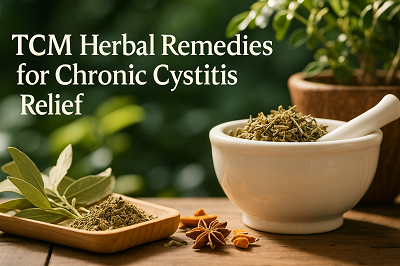TCM Herbal Remedies for Chronic Cystitis Relief
In the theoretical framework of Traditional Chinese Medicine (TCM), chronic cystitis is categorized under "Lin syndrome" (strangury) and "Long Bi" (urinary retention). Its pathogenesis is often attributed to the invasion of damp-heat pathogens affecting the kidneys and bladder, leading to the accumulation of damp-heat in the lower Jiao (lower body). This manifests as symptoms such as frequent urination, urgency, painful urination, and discomfort.

TCM treatment for this condition follows the principles of clearing heat, dispelling dampness, promoting urination, relieving strangury, and invigorating blood circulation to resolve stasis. These approaches aim to balance damp-heat in the body and restore the normal function of the bladder and kidneys. Below, we introduce several TCM formulas that adhere to these therapeutic principles.
1. Urinary Clearing Decoction
The Urinary Clearing Decoction is composed of over a dozen herbs, including talc, pyrrosia leaf, smilax, and dandelion. This formula offers comprehensive benefits: it clears damp-heat, promotes urination to relieve strangury, strengthens the spleen, and nourishes the kidneys.
It is primarily used to treat "labor strangury," a condition associated with chronic urinary tract infections (such as urethritis, cystitis, pyelonephritis, and prostatitis), which cause symptoms like urinary urgency, frequency, lower abdominal distension, low-grade fever, fatigue, and recurrent infections. By regulating the spleen and kidneys, this decoction enhances the body's resistance, improves overall constitution, and reduces the likelihood of recurrence.
2. Diuretic and Anti-inflammatory Pill
The Diuretic and Anti-inflammatory Pill, a standout TCM formula, combines the essence of over 50 herbs, including plantain seed, talc, dianthus, and polygonum aviculare. This formula excels in clearing heat, detoxifying, invigorating blood, relieving pain, and promoting urination to relieve strangury. Specifically tailored to the pathology of chronic cystitis, it incorporates herbs like peach kernel and vaccaria seed to combat hyperplasia, calcification, and fibrosis, effectively preventing proliferation and follicular formation in the bladder's trigone area.
3. Ma Weng Decoction
The Ma Weng Decoction, carefully formulated with purslane, anemone, and cyathula root, delivers multiple benefits: it promotes urination, relieves strangury, provides antibacterial and anti-inflammatory effects, and invigorates blood to alleviate pain. For chronic cystitis patients, this decoction directly targets the affected area, easing inflammation-related discomfort. Its flexibility allows for customization based on individual symptoms.
For instance, patients with hematuria can add imperata root and small thistle to cool the blood and stop bleeding; those with lower abdominal distension can include peach kernel or amber to invigorate blood and resolve stasis; and those with lumbar discomfort can add phellodendron and anemarrhena to clear heat and dry dampness, or eucommia to strengthen the waist and kidneys. This reflects the TCM principle of syndrome differentiation and personalized treatment.
4. Strangury-Relieving Decoction
The Strangury-Relieving Decoction, a potent formula made from plantain seed, dianthus, polygonum aviculare, licorice, and other herbs, focuses on transforming qi, moving water, promoting urination, and relieving strangury. This decoction is particularly effective for lower urinary tract infections, especially chronic cystitis. By facilitating the expulsion of damp-heat and improving the urinary tract environment, it alleviates symptoms like urinary frequency and urgency, helping patients regain comfort and ease in daily life.
5. Modified Polyporus Decoction
The Polyporus Decoction, composed of polyporus, poria, alisma, and donkey-hide gelatin, is designed to clear heat, promote diuresis, nourish yin, and moisten dryness. Originally used for conditions involving water-heat entanglement with yin deficiency—such as heat strangury, blood strangury, or hematuria—this formula can be adapted for chronic cystitis.
Modifications include adding gardenia and plantain seed to enhance heat-clearing and diuretic effects, or imperata root, large thistle, and small thistle to cool the blood and stop bleeding for cases with hematuria or blood strangury. The adaptability of this decoction ensures precise, individualized treatment.
Important Considerations
The above TCM formulas are effective for treating chronic cystitis, but their use requires caution and expertise. Each patien's constitution and condition vary, so it is critical to consult a qualified TCM practitioner before using these formulas. Treatment must be based on syndrome differentiation to ensure safety and efficacy.
Avoid self-medicating or following trends blindly, as improper use can lead to suboptimal results or complications. Only under professional guidance can these formulas be used safely and effectively to achieve the best outcomes.



